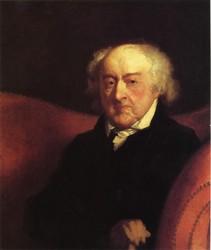John Adams History
|
| updated |
Copy Link Code
|
 The history of John Adams is integral to the history of the political advances of Independence and the first two decades of American government. As an influential member of the Continental Congress, the first Vice President and the Second President, Adams was the mastermind behind many of the decisions that shaped the early United States. Adams was one of the strongest proponents of Revolution in the Continental Congress and he even helped Thomas Jefferson with the drafting of the Declaration of Independence. By the end of the war, Adams was in the party of diplomats who negotiated the terms of peace. Soon after, the U.S. Constitution would be based in large part on the Massachusetts State Constitution, a majority of which was written by Adams himself in 1780. Adams was an obvious choice for the Vice Presidency under George Washington and served for both terms before being elected President in 1796. Adams was a Federalist, an advocate for centralized federal power and a national bank; these views put him at odds with Thomas Jefferson, leader of the Democratic-Republicans, who defeated Adams in the election of 1800. After this defeat, John Adams' history became less political as he retired from public life and eventually rekindled his friendship with Jefferson. Adams died on July 4th, 1826, only hours after Jefferson passed away. Ironically, his last recorded words were, "Thomas Jefferson survives."
The history of John Adams is integral to the history of the political advances of Independence and the first two decades of American government. As an influential member of the Continental Congress, the first Vice President and the Second President, Adams was the mastermind behind many of the decisions that shaped the early United States. Adams was one of the strongest proponents of Revolution in the Continental Congress and he even helped Thomas Jefferson with the drafting of the Declaration of Independence. By the end of the war, Adams was in the party of diplomats who negotiated the terms of peace. Soon after, the U.S. Constitution would be based in large part on the Massachusetts State Constitution, a majority of which was written by Adams himself in 1780. Adams was an obvious choice for the Vice Presidency under George Washington and served for both terms before being elected President in 1796. Adams was a Federalist, an advocate for centralized federal power and a national bank; these views put him at odds with Thomas Jefferson, leader of the Democratic-Republicans, who defeated Adams in the election of 1800. After this defeat, John Adams' history became less political as he retired from public life and eventually rekindled his friendship with Jefferson. Adams died on July 4th, 1826, only hours after Jefferson passed away. Ironically, his last recorded words were, "Thomas Jefferson survives."
Born in 1735 to a family of Puritans descended from early pilgrims to Massachusetts, Adams took an early fascination with reading, especially the works of Enlightenment philosophers and John Winthrop, a Puritan leader whose essays laid the groundwork for American exceptionalism. Adams earned a scholarship to attend Harvard and graduated at only 20 years of age. He was admitted to the Bar of Massachusetts in 1761 and began to take on legal cases. Adams first became known for the "Braintree Instructions" and Essay on Canon and Feudal Law of 1765, both of which encouraged resistance to the Stamp Act imposed by the British Parliament. He was the first to argue that colonists should not be legally bound to taxation without representation. In 1770, after British soldiers fired upon a crowd of colonists in the event known as the Boston Massacre, Adams showed great integrity in taking on the defense of the British soldiers despite his own liberal views. He was successful in defending six of the eight soldiers on the basis that they were defending themselves for the threat of an angry mob. Adams was elected to the Massachusetts General Court in the same year and was an obvious choice four years later to represent the state at the First Continental Congress.
History on John Adams must also involve his well-recorded family life. His wife, Abigail Adams, was also an avid reader and shared her political opinions with John through letters they wrote to each other during his time in Congress and as a diplomat in Europe. They had five children together, though another was lost to miscarriage in 1777. Their eldest son, John Quincy Adams, would go on to lead his own illustrious political career as Secretary of State and the sixth President of the United States. John Adams' grandson, Charles Francis Adams, Sr., utilized John Adams' history for profit and political gain when he published a biography on his grandfather as well as a compilation of letters written between Abigail and John. John Adams passed away while his son was serving as President.
